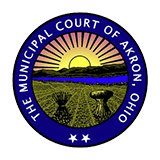History
In 1910, the legislature established a police court in Akron vested with jurisdiction over offenses under the ordinances of the city and all misdemeanors committed within the limits of Summit County. It was made a court of record and presided over by an attorney duly admitted to practice in this state.
In 1919, the legislature established the Akron Municipal Court with three sitting Judges elected to four-year terms. In 1930, two judgeships were added to the court. In 1939, the legislature reduced the number of judges from five to four. A fifth Judge was again made a member of the court in 1967 and the sixth judgeship was created in 1975. The Judges now serve six-year terms.
The court now serves a jurisdiction which includes the cities of Akron and Fairlawn; the townships of Bath, Richfield, and Springfield; the villages of Lakemore and Richfield; and that part of Mogadore in Summit County.
In 1966, the court moved into the City-County Safety Building which was renamed the Harold K. Stubbs Justice Center in 1991 located in Downtown Akron. In 2023, the Akron Municipal Court moved into its new facility at 172 South Broadway Street in Downtown Akron.
Our six Judges are: Judge Annalisa S. Williams, Judge Jerry Larson, Judge Jon Oldham, Judge Ron Cable, Judge Nicole Walker and Judge David Hamilton.
In addition to our Judges’ general court hearings and decisions, we have six specialized dockets: Mental Health Court, Recovery Court, OVI Court, Family Intervention Court, RISE Court and Valor Court for individuals with military service.
We strive each day to bring access to justice to those in our jurisdiction. Our mission is “To promote public confidence and trust in the judicial system by protecting rights and liberties; Upholding and interpreting the law consistently, timely, impartially and independently; And providing for the peaceful, fair and efficient resolution of disputes.”
